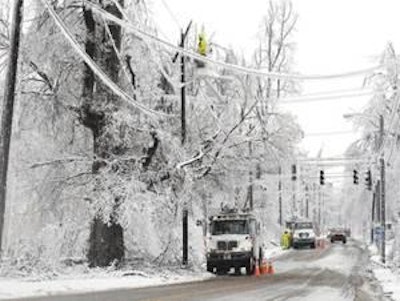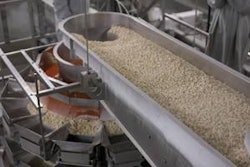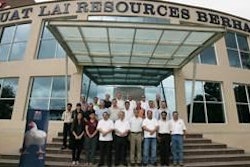
How Perdue Farms dealt with a catastrophic ice storm in the winter of 2008-09 is a preparedness model for poultry producers. Planning and preparation are essential in everything from making sure electrical generators with fuel are in place to deploying feed delivery trucks and satellite phones.
Perdue Farms’ Cromwell, Ky., broiler complex is in a part of the country that experiences some significant snowfall just about every year, but a massive ice storm in January 2009 put its emergency preparedness to the test.
Speaking at the North Carolina Broiler Breeder and Hatchery Management Conference, Perdue’s live production manager at the complex, Lynde Hughes, said a typical winter normally has two or three snow events of eight to 10 inches.
Heading into the winter of 2008-2009, the company’s plan for coping with these storm events had three major components:
Live production personnel knew that operations shifted to the hatchery in the event of power outages.
All on-farm generators were given semiannual service checks.
On-farm feed inventories were ramped up beginning in mid-December.
Not an ordinary storm
A light snow began to fall in Kentucky on January 26, 2009, but the precipitation turned to freezing rain and snow and continued for three days. Then, the first week in February brought more frozen precipitation. Accumulation totals ranged from 2-10 inches of snow and 1-3 inches of ice, which coupled with high winds brought down trees and power lines over a wide area.
One hundred and one of Kentucky’s 120 counties were affected. In some cases, miles of high voltage lines came down as towers collapsed.
Power outages to Perdue operations and farms started on Tuesday night, February 3, and by Wednesday morning there was no power and no landline or cell phone communication.
Communications cut off
Fallen trees and tree limbs were everywhere. “If you didn’t have a chain saw, you weren’t going anywhere,” Hughes said. “It took me an hour to get out of my driveway.”
Hughes hoped that the complex’s 123 farms all had generators working, but he had no way to check. The hatchery’s generators were running on Wednesday morning, and though there was no hatch scheduled for that day, come Thursday morning, 275,000 chicks were going to need to go out to farms.
“We called the producers as usual on Tuesday for Thursday delivery,” Hughes said. “The storm hit Tuesday night and on Thursday morning there were still no phones and we didn’t know if we could get to the farms. I am so thankful; we have such a good relationship with our producers. They went ahead and got their houses ready, running on generator power. They just assumed the chicks were coming. I am not going to say that chick delivery was smooth, but we did not miss a chick delivery.”
Feed mill out of power
When the storm hit, the feed mill had 2.5 days worth of finished feed in inventory. Initially, the mill was completely without power. Generators were obtained which allowed for feed to be loaded out, but it was four days before generators arrived and were hooked up which could allow for feed manufacture.
Feed was purchased from mills that had power and delivery vehicles were brought in from other areas. With all of these efforts, no birds were out of feed for more than 20 hours.
Don’t be afraid to ask for help
It didn’t take long for Hughes to realize that it was not a normal ice storm. Everyone was without power, and there was no communication. In circumstance like this, “Even a great team can be overwhelmed, you will need help,” he said.
Perdue sent help from other complexes, including personnel, equipment and even vendor support. Satellite phones were brought in to restore some level of communication and teams were formed and assigned specific tasks. Power, road, compost, chick delivery, feed delivery and feed manufacturing teams focused resources on problems specific to each area.
Keeping the generators running
Atlantic Power Solutions, a vendor used by Perdue in North Carolina, provided four technicians to service on-farm generators in Kentucky. Each technician was paired with a Perdue employee who new the local roads and best routes to the farms. Technicians visited every farm within the first couple of days and checked out the generators. All of the machines started, but they were not ready for long-term, continuous use, according to Walter Petty, Atlantic Power Solutions.
There were only four true equipment failures, Petty said, but there were lots of fuel filter problems. It is important to have replacement fuel filters on hand at all times, he said.
Many diesel generators are not run enough hours to keep the fuel fresh. Fuel that sits in the tank for an extended period of time can accumulate condensation, and algae can grow in it. Impurities in the fuel can clog the fuel filter, starve the engine of fuel and cause the generator to shut down. Petty said that some growers were reporting low oil pressure shut downs for their generators. The real problem was that the fuel filter clogged and the engine would start to bog down and show low oil pressure.
After 15 days, only four farms were still on generator power, so the technicians went back to North Carolina.
Lessons learned
The last farm came off generator power 28 days after the storm ended. All of the generators started initially, but since the phones weren’t working, the alarms did not work.
All told, three houses of birds were lost due to power problems. While the storm’s impact on the complex could have been a lot worse, Hughes said things could have gone even smoother with more preparation. As a result, the company has altered emergency plans for this winter.
Perdue has purchased satellite phones which are kept in Alabama during hurricane season and deployed in Kentucky in winter months.
Growers have been notified that the hatchery is the emergency meeting place for live operations and phone calls should be directed there. During last year’s storm, growers didn’t know to call the hatchery once telephone service was restored.
Lessons learned on generator operation and maintenance have been shared with growers (see "Generator tips" below).
Power transfer equipment is now in place at the feed mill so that generators can be hooked up more quickly during any future power loss.
Actual on-farm feed inventories are kept up-to-date to facilitate ramp up of feed inventories going into the winter months.


















